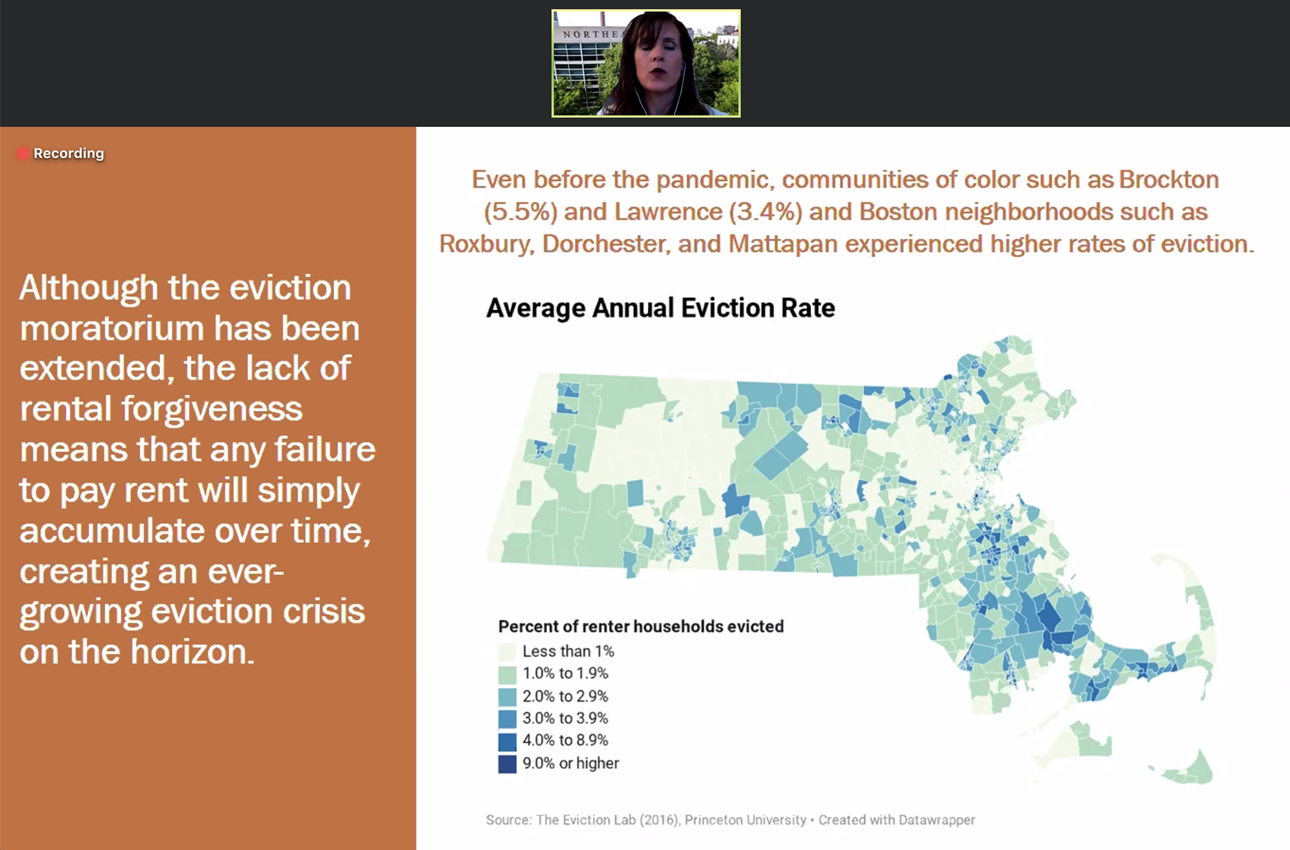The 2020 Greater Boston Housing Report Card, Part 3: Housing Equity and Resilience in Greater Boston's Post-COVID Economy
Finding our Way Back to Better
September 23, 2020
The Boston Foundation’s 17th Greater Boston Housing Report Card, formatted into a webinar series in this pandemic year, presented its third and final research brief on September 23. Alicia Sasser Modestino, Research Director at Northeastern University’s Dukakis Center for Urban and Regional Policy, shared data she had analyzed for a look ahead at what lies on the housing horizon as our region begins an economic recovery after COVID-19.
It’s not a pretty picture. As Modestino outlined, extended and augmented unemployment insurance helped many people through the initial shut-down. Although the public health and economic crisis hit Greater Boston with particular speed and severity owing to the region’s mix of industries and employers and its heavy COVID caseload, most people managed to pay their rent through the spring.
Worse yet, low- and moderate-income renters don’t live in a bubble. Of the landlords who’d like to collect rent, 68 percent are small-scale owners who rely on rental payments to make their own mortgage or property tax payments or for their main source of income. Without rental supports, they may end up foreclosing or selling their units to a more heartless commercial investor landlord with few qualms about evicting tenants behind on their rent the instant a moratorium is over.
Modestino shared other stats projecting the challenges ahead, including reduced consumer spending, softening of the labor market and the persistence on the books of suspended eviction proceedings, but acknowledged that “the pandemic has only exacerbated pre-existing inequities that have contributed to the lack of housing stability in the Greater Boston region for decades.”
Against that backdrop, Boston Foundation Director of Neighborhoods & Housing Soni Gupta led a conversation among three regional housing pros, who each shared the view from their distinct vantage point. Keith Fairey, CEO of Way Finders, talked about the housing situation in the western part of the state. Unsurprisingly, Franklin, Hampden and Hampshire counties face some of the same housing dynamics as Greater Boston (i.e., high housing costs and low income growth) plus some challenging variations, with more rural areas in the mix, an older population and an economy that still had been lagging from the last crisis. Project Hope Executive Director Christine Dixon shared how her organization has evolved from a small Dorchester shelter 40 years ago to a service provider offering eviction prevention supports to families. Project Hope is also offering other kinds of counseling, including to independent landlords, who themselves are confused about the restrictions of the moratorium and the supports offered to them. Taylor Cain, Director of the Housing Innovation Lab, represented the City of Boston. As her group’s name implies, its goal is to imagine new futures—and even take risks—through a prototype-driven approach to policy that brings all stakeholders in the ecosystem to the conversation. She allowed as how the City is concerned about that snowball effect of rent arears coming due and the ripple effect that will have. Her work, like the others’, attempts to balance the immediacy of the need while keeping longer-term improvements in mind.
Indeed, in introducing the morning’s event, Boston Foundation CEO Paul Grogan had pointed out the Foundation’s drive to solve more than the present exigency. “The housing situation was already an emergency,” he said, “and a threat to Boston’s continued economic vitality. We started in a bad place and things got progressively worse with the pandemic. We have to accept the challenge and respond with a much larger commitment. And we can hope that this challenge will yield greater creativity in problem-solving opportunities.”
That spirit is why the research brief at the heart of the discussion was titled Back to Better. There are parts of “normal” no one wants to return to. Researcher Modestino offered these recommendations as a starting place.
1. Protect the most vulnerable renters from housing disruption
2. Support low-income households before they have trouble making payments
3. Make housing more affordable and accessible
None of these are simple, but with leaders like the panelists gathered at this event, and the will of concerned residents in the Commonwealth, there is cause for hope.
To see Alicia's presentation slides, click here.
Click here to learn more about Part 1 of the 2020 Greater Boston Housing Report Card series.
Click here to learn more about Part 2.

